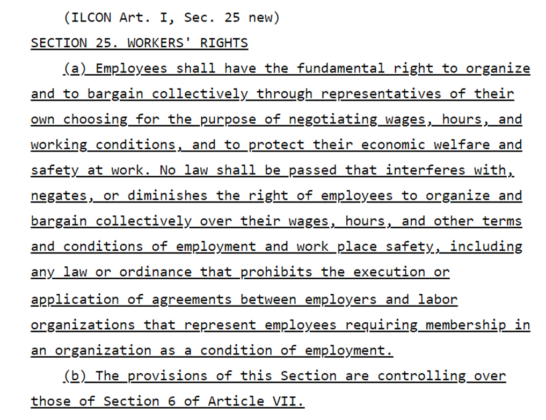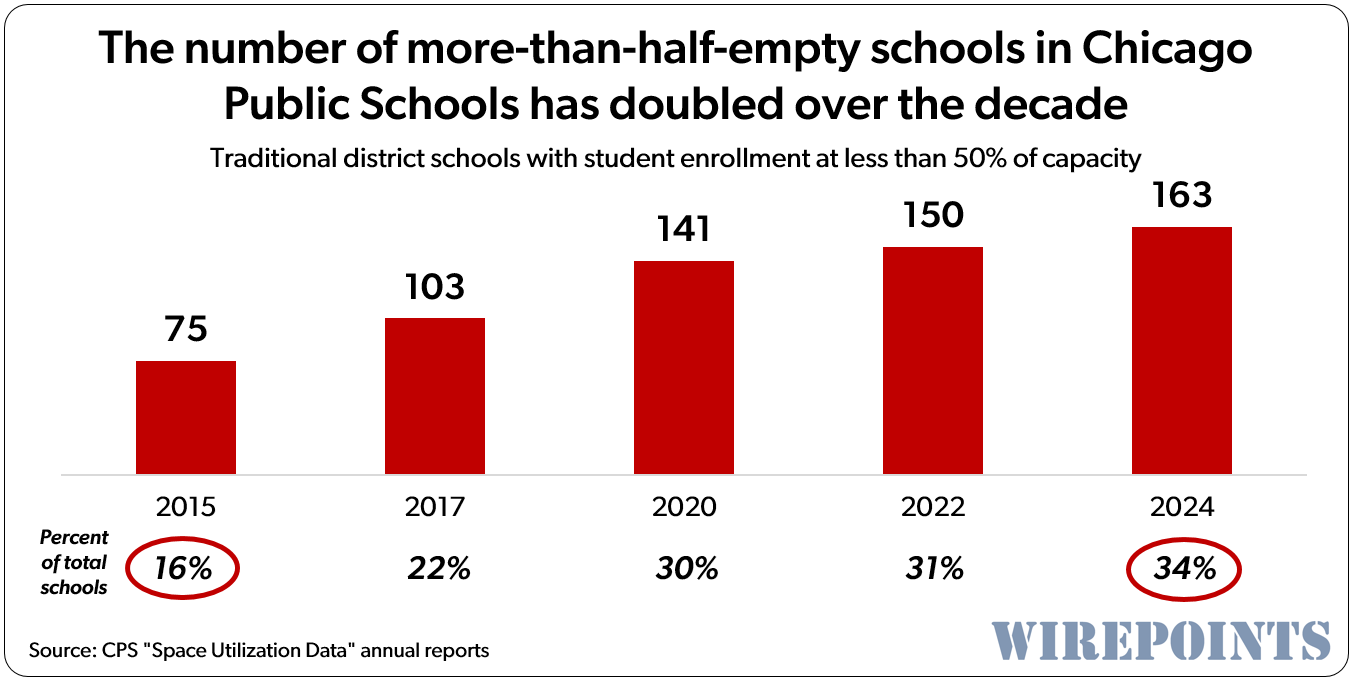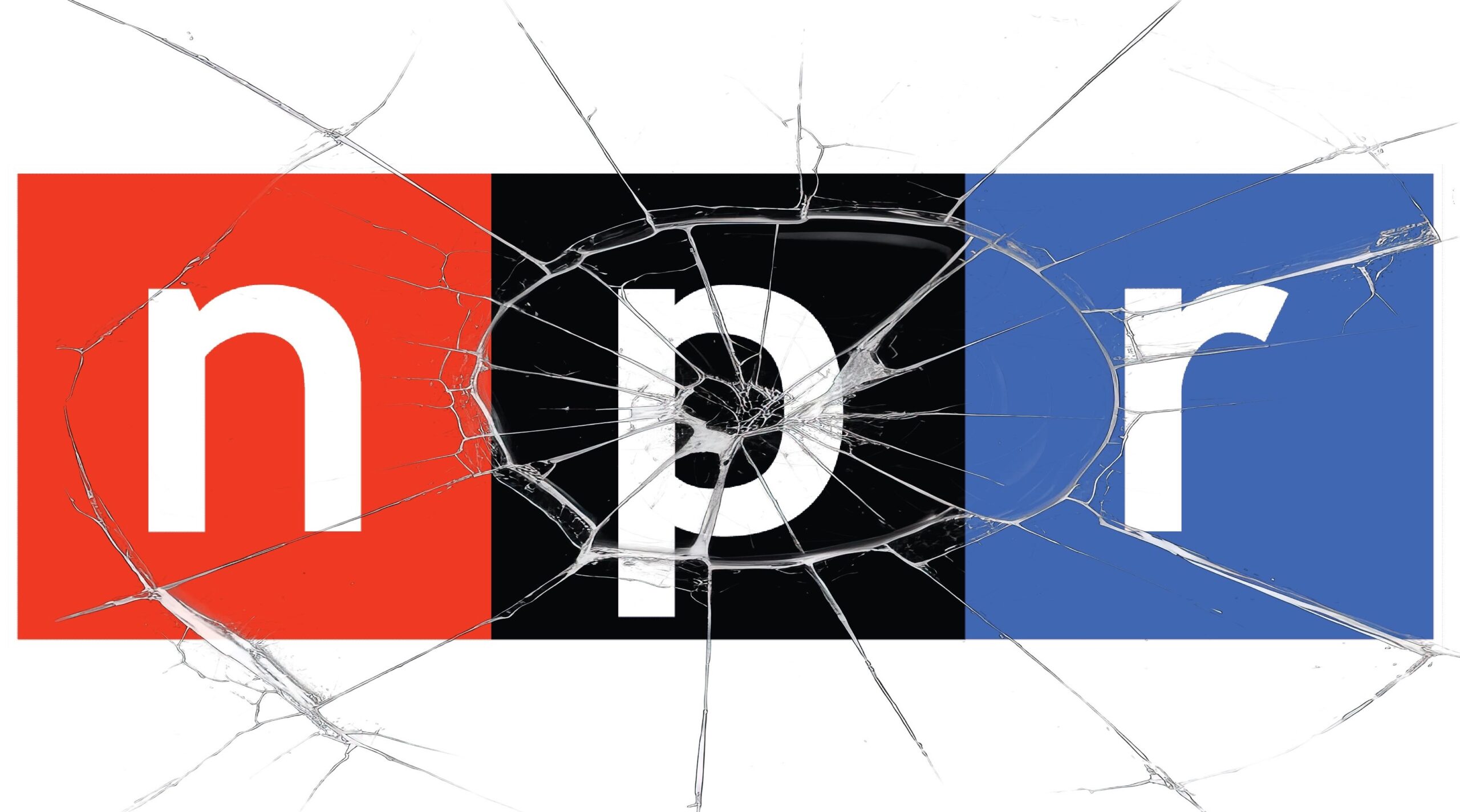By: Mark Glennon*
UPDATE: The resolution for the amendment has now passed both the Illinois House and Senate, sending it to voters to decide on the November 2022 ballot.
Most Illinoisans are unaware, but their General Assembly is poised to pass a resolution for a state constitutional amendment, the consequences of which are hard to overstate. It would vastly expand union power, permanently, particularly public union power that is already extreme.
Limited media coverage so far characterizes the amendment mostly as an attempt to permanently ban right-to-work and lock in current worker protections. That would be bad enough, since the majority of states are now right to work including nearby competitors Wisconsin, Michigan, Indiana and Iowa. And Illinois is already an outlier in how much power it has given to public unions, particularly in collective bargaining rules.
 But that’s just the start. Think hard about what the short amendment, shown here, would do. Read it and consider the following:
But that’s just the start. Think hard about what the short amendment, shown here, would do. Read it and consider the following:
The first sentence, by itself, creates a new, personal constitutional right. That right would take all covered matters described in that sentence out of the hands of the legislature and local governments, subjecting it all, instead, to collective bargaining.
Both the scope of that right and the rules for how the collective bargaining would be conducted are sweeping and open-ended. Note in particular that all matters of “economic welfare” would be forced into collective bargaining, and those matters of economic welfare apparently need not be tied to the workplace (though that’s not entirely clear).
What isn’t a matter of “economic welfare”? Practically nothing. The Chicago Teachers Union has attempted in the past to include matters like affordable housing in its bargaining. Under the amendment it would clearly have a strong case for demanding any number of such policies as part of its contract negotiations. Same for any other union.
The broad, new right would override extensive law already in place. Today, public union negotiation is covered by the lengthy Illinois Public Labor Relations Act and the Illinois Education Labor Relations Act. Private unions are governed by both federal and state law.
But constitutional rights trump all state law, so claims based solely on the new amendment would be asserted. Public unions would have a field day in Illinois courts. The amendment would throw everything open to a new standard that only the courts would define, and we know that Illinois’ political courts routinely rule as unions want.
The second sentence is irrational surplus on its face. Since a constitutional right is already created by the first sentence, why bother saying that “no law shall be passed” that contradicts the things for which a constitutional right is already created in the first sentence? Note also that there’s no reference to existing rights, so this is not about locking in current law. The key is that first sentence, which creates something entirely new.
One example of how the amendment would work is pension reform. Suppose the legislature some day goes back to the courts to try again claiming the facts have changed (as they already have) since the courts last ruled against reform. Or perhaps the composition of the Illinois Supreme Court changes in favor of reformers. As before, the legislature would then pass a reform bill that the unions wouldn’t like. But the unions, under the amendment, would answer that reforms could only be made through collective bargaining. It wouldn’t be a matter legislation could change. The amendment would thereby create an additional bar to pension reform, just as it would to any other change in labor law.
Trial lawyers, too, would have a field day with the amendment. Because the proposed amendment is so open-ended and horribly worded, the claims they might assert would be limited only by their imagination.
I have focused so far on the proposed amendment’s impact on public unions for two reasons.
First, let’s just stipulate that much of Illinois’ problems derives from their excessive influence over Illinois government, because every informed Illinoisan knows that.
Second, the powers behind the proposal have basically admitted that it’s intended to benefit public unions. Sen. Ram Villivalam (D-Chicago) is lead sponsor of the measure in the Senate.
As reported by Capitol News Illinois, Villivalam said it would have minimal impact on private-sector workers because the National Labor Relations Act governs organizing and collective bargaining in the private sector. He said the intent was to protect the right to collective bargaining that is already established under the Illinois Public Labor Relations Act and the Illinois Education Labor Relations Act, and those are for public unions.
Villivalam’s admission is probably right, but he’s wrong to disregard the impact the amendment might also have on private sector labor.
One lawyer we heard from on that is Jeff Risch, who chairs the labor and employment group at the SmithAmundsen law firm. He primarily represents small and mid-size employers that occasionally are able to voluntarily reach agreements to remain union-free. The amendment would apparently make that impossible, he said, by giving any employee a constitutional right to bargain collectively. For that and other reasons, “This amendment will seal Illinois’ fate forever,” he says.
Also, much of private sector collective bargaining is controlled by federal law. Insofar as the amendment purports to override it, complex questions of preemption would have to be litigated, which is another mess the amendment would create.
To summarize, drafters of the proposal have made it deliberately and deceptively ambiguous and misleading, but also radically broad and open-ended. By creating a new constitutional right they would be throwing a cluster bomb toward everything in their way. The amendment’s full impact may not be entirely certain but it would, for sure, clear a path to new, unimagined union power.
*Mark Glennon is founder of Wirepoints.
Read more about the union power amendment and Illinois’ public unions:
- Illinois lawmakers want to cement union powers into the state constitution
- Advancing an amendment to enshrine union power
- Another budget surprise: Pritzker hits up middle-class Illinoisans for more AFSCME raises, stipends and benefits
- Appease the Chicago Teachers Union and this is what you get
- Springfield fiddles while Illinois cities burn

 A set of state lawmakers want to extend CPS’ current school closing moratorium to February 1, 2027 – the same year CPS is set to transition to a fully-elected school board. That means schools like Manley High School, with capacity for more than 1,000 students but enrollment of just 78, can’t be closed for anther three years. The school spends $45,000 per student, but just 2.4% of students read at grade level.
A set of state lawmakers want to extend CPS’ current school closing moratorium to February 1, 2027 – the same year CPS is set to transition to a fully-elected school board. That means schools like Manley High School, with capacity for more than 1,000 students but enrollment of just 78, can’t be closed for anther three years. The school spends $45,000 per student, but just 2.4% of students read at grade level.
 Hopefully, all media will get the message, in Illinois, too.
Hopefully, all media will get the message, in Illinois, too. Ted joined Tom Miller of WJPF to talk about Illinois’ highest-in-the-nation property taxes, why lawmakers don’t want to touch the tax’s cost drivers, just how much Illinoisans’ tax burden has grown over the decades, why Gov. Pritzker failed to meet his promise to reform property taxes, and more.
Ted joined Tom Miller of WJPF to talk about Illinois’ highest-in-the-nation property taxes, why lawmakers don’t want to touch the tax’s cost drivers, just how much Illinoisans’ tax burden has grown over the decades, why Gov. Pritzker failed to meet his promise to reform property taxes, and more.
Public Disservice Unions want to get paid more for their Block Vote, and they want the power to make this happen in writing. The current “never to be impaired or diminished” clause that a particularly weak governor gave away to them isn’t enough anymore. Rip up existing agreement and start over with this corrupt group of bandits.
Worth repeating …………..
Public Sector Unions (AND the Legislators that do their bidding) are a CANCER inflicted upon Civilized Society.
The Hyenas rand sacking the Pride Lands…
This is an election turnout ploy as much as anything else. Pritzker has a lot of difficult issues to address next year– bad economy, bungled IDES closures, destruction of the restaurant and hotel industries, rising crime all over the state, etc. One thing he can not allow is for some political opponent to drive a wedge between him and the unions that put him in power. By pushing this amendment hard it doesn’t allow even a slight degree of separation for someone to horn into. And this will drive up union voter turnout big time for him. I many ways,… Read more »
You are certainly right that this is an election turnout play for his base. However, I think it will backfire IF the public can be properly educated about it. The unions no doubt will pump a fortune into lies about it, and that will be difficult to counter. For our part, we intend to educate the public about what it would really do.
Why would anyone not in a union care about this constitutional amendment? They won’t.
My guess is that this bill will fail too.
IL residents have consistently showed showed in recent decades a reluctance to mess with the constitution.
While I don’t think this amendment passes it may be closer than you think. In the 2018 (last Illinois Gov) election, about 4.6 million total ballots were cast. If 2022 is similar, the amendment will need about 2.3 million votes to pass. There are 739k union members in the state. These people will be very motivated to vote for this amendment and their turnout will be strong. What about their spouses, significant others or other family members that depend on this union household? This amendment could be starting with a support base of 1.5 million voters. That leaves 3 million… Read more »
A wise sage once told me never to assume that the insurance company yes-man gives two craps about the insurance company. He probably hates the insurance company as much as you do, maybe even more. My experience with union members is the same. And trust me, I have more experience with unionized employees – both public and private – than the average person. Many union members dislike the unions just as much as everyone else but they have no choice but to work in closed shops with union leaders who have little interest in managing the day-to-day grievances of the… Read more »
And the people of Illinois would be against this. How and why? I am pretty sure a majority of people working in Illinois who vote are part of some union. How on earth is this bad for them? Y’all don’t like it then move to almost any state right next to you…..seriously.
“The People vs The Democratic Party”, by Michael Walsh
‘The Democrats, in essence, are nothing less than a criminal organization masquerading as a political party’
Proofread the updated first paragraph. The November 2020 election?
I can’t say I am a big fan of this for the reasons already mentioned.
On the other hand I have absolutely no say in anything. I have seen instances were 20 year employees are paid equally or less as a new hire. Facts are manipulated to favor who the manager what’s to win. Sure sometimes they say they want opinions but even then speaker beware.
IF the employee wants any sort of grievance addressed fairly get a lawyer or find a different job.
Just keep in mind that this amendment is not a simple issue about whether employees deserve to be treated fairly. That’s how its supporters are spinning it — “Oh, we just want to protect basic rights of the working class, etc.” No, no, no, this is a radical monstrosity. We may have been the first here to explain why, but you can count on others who will back up our interpretation — in the national media if not IL media.
On a different note the State House w/o opposition approved Junteenth as a state holiday. When does the political correctness end?
The last Constitutional amendment that these democrats tried to pass — The Fair Tax — failed. There were a couple of wealthy benefactors that put some real dollars in to counter the campaign led and funded by democrats and public unions. I don’t know how much the counter-campaign impacted the final vote, but anecdotal evidence suggests that it was effective. These public unions never quit. At what point do the wealthy benefactors (Ken Griffin et al) just give up and say, “it’s just not worth it anymore” because the unions will keep trying until the state goes bust? Then, because… Read more »
Agreed. This new amendment proposal is far more insidious than the last one and may be more difficult to explain. You can see that already in the way the press has overlooked the issues above. The far left and public unions are truly flooding the zone with so many atrocities that it’s impossible to educate the public quickly enough about what is going on.
How could SJRCA 11 in the 102nd ILGA be used as part of a strategy to restore mandatory fees as a condition of employment in state and local public sector collective bargaining agreements in Illinois?
In other words a strategy to cancel the US Supreme Court decision in Janus vs. AFSCME as it applies to Illinois.
It seems to me that the resolution on its face would allow that, but Janus would overrule it, being based on 1A of US Constitution.
Continuing that thought. Janus overruling the proposed state constitutional amendment hinges of course on the makeup of the US Supreme Court. Janus v AFSCME was a 5-4 decision and since then liberal Justice Ginsburg has been replaced by conservative Justice Barrett, which may equate to a a hypothetical 6-3 decision based on the decision making tendencies of the current court members. Thus the talk by some on the left of adding Justices to the US Supreme Court (Supreme Court packing). Adding 4 liberal judges may result in a hypothetical 7-6 US Supreme Court decision to overturn Janus. And speaking of… Read more »
If any non-represented employee of mine tried to use this law, they’d be fired.
The amendment establishes a personal right. Query what will happen if a union organizing campaign fails in the private sector for lack of sufficient votes? The frustrated minority of employees could well bring a claim under the amendment, because the personal right never ends. There of course would be federal pre-emotion defenses for employers but those would have to be sorted out in the courts, a time consuming and expensive process. Of course, this is a feature, not a bug. Of course, the main thrust of the amendment is to frustrate attempts at public sector union reform. I read the… Read more »
Yup. On your first point, you are right that any one individual could assert the right, which creates a horrible mess. This truly is as if the drafters are intending to throw a cluster bomb with the absurd scope and wording.
“ But constitutional rights trump all state law. . .” What about balanced budget amendment and #2? Huh?
It’s called selective enforcement.
So, just another amendment to ignore. Great